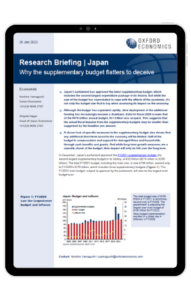Why Japan’s supplementary budget flatters to deceive

Japan’s parliament has approved the latest supplementary budget, which includes the second-largest expenditure package in its history. But while the size of the budget has skyrocketed to cope with the effects of the pandemic, it’s not only the budget size that is key when assessing its impact on the economy.
What you will learn:
- Although the budget has expanded rapidly, slow deployment of the additional funding has increasingly become a drawback. Data for fiscal 2020 reveals that of the ¥176 trillion annual budget, ¥31 trillion was unspent.
- A closer look at specific measures in the supplementary budget also shows that any additional short-term boost to the economy will be limited.
- Half of the budget is compensation and support for damaged firms and households through cash benefits and grants. And while long-term growth measures are a sizeable chunk of the budget, their impact will only be felt over the long term.
Tags:
Related Services

Post
Industry Key Themes 2025: Industrial landscape at a critical juncture
Following prolonged weakness in 2022 and 2023, industrial growth is now regaining momentum.
Find Out More
Post
Czech Republic: Near-term recovery, long-term struggle
We believe the Czech Republic will move to the upper one-third of the fastest-growing EU economies in 2025-2026 after lagging its EU peers in the last four years. However, much of this will be catch-up growth, mainly in consumer spending, where a large shortfall remains. Relative to pre-pandemic, the economy will remain in bottom one-third of the EU, behind its CEE peers.
Find Out More